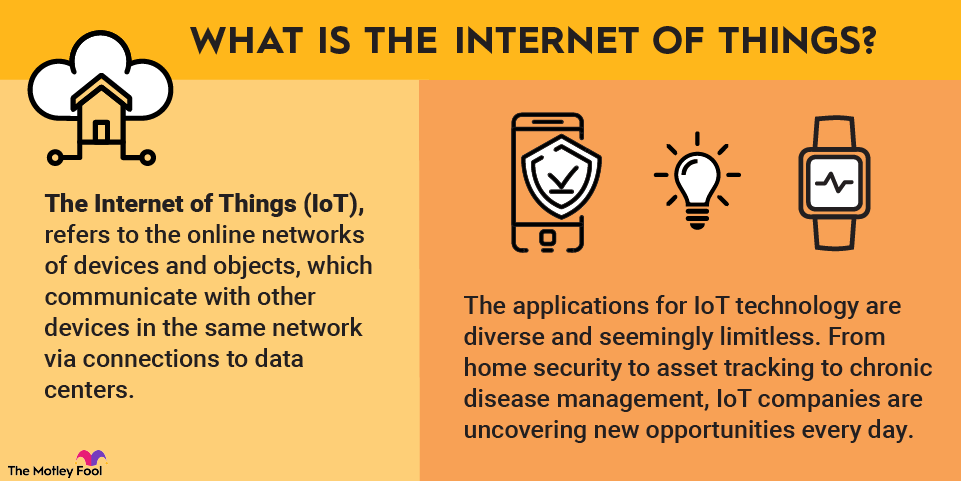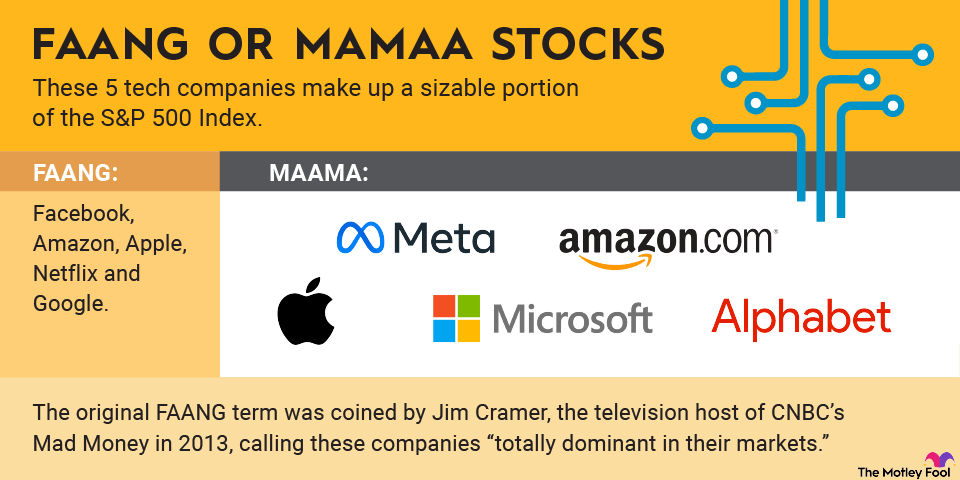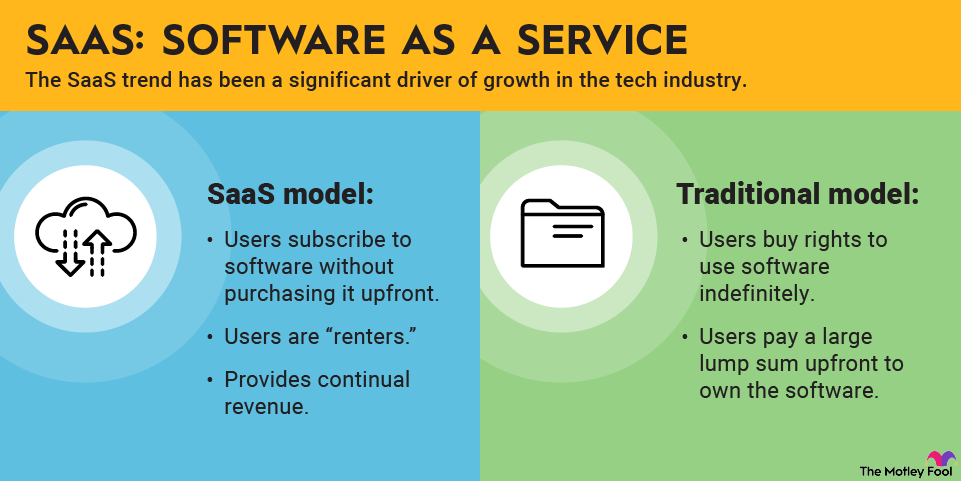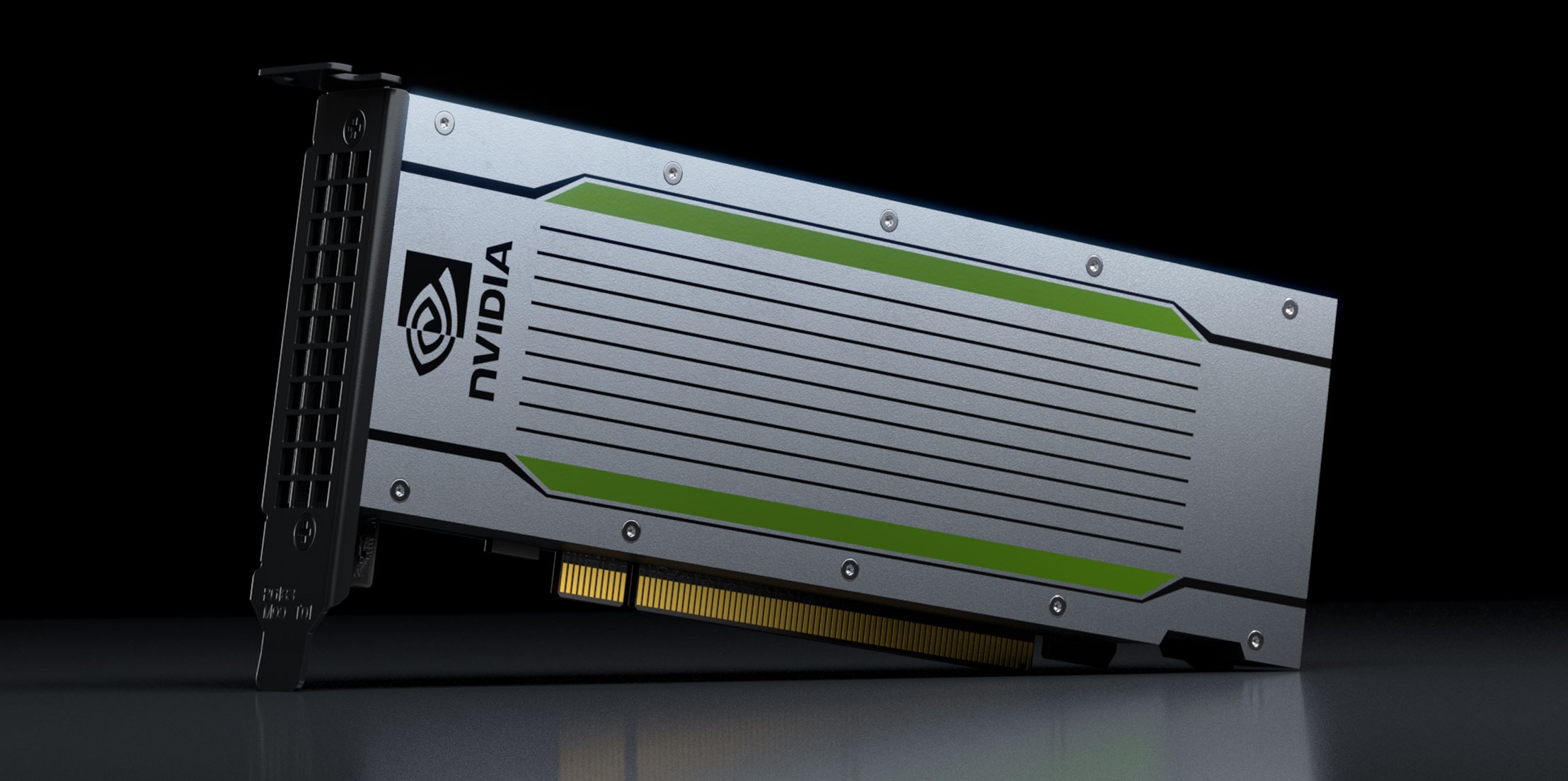Cloud computing stocks offer exposure to companies that provide internet-based computing services, infrastructure, platforms, or software. These companies enable businesses and individuals to store, process, and access data and applications remotely rather than on local servers or personal computers.
Cloud Computing
Although cloud computing boomed during the 2010s, this next-gen IT industry is still in the early innings. For years, organizations around the globe have been migrating their operations to the cloud -- digital data and services stored within a remote data center and accessed via the internet.
However, the rise of remote work during the COVID-19 pandemic accelerated the trend. Now, generative artificial intelligence (AI) has kicked off the next wave of cloud expansion.

Business research provider Grand View Research projects that spending on global cloud computing (including data center infrastructure and edge computing) will increase at a 21.2% compound annual growth rate (CAGR) from an estimated $752.4 billion in 2024 to $2.4 trillion in 2030.
Cloud computing is also closely tied to other tech developments such as mobile 5G networks, the Internet of Things (IoT), and artificial intelligence (AI). Clearly, cloud computing stocks are a top investment theme for 2025 and the decade to follow.
Artificial Intelligence
Investing in the best cloud computing stocks of 2026
To get started, the best cloud stocks to invest in are the five largest public cloud giants:
- Amazon (AMZN +1.07%) Web Services (AWS)
- Microsoft (MSFT -1.22%) Azure
- Alphabet's (GOOGL +1.26%) (GOOG +1.17%) Google Cloud
- Oracle (ORCL -2.74%) Cloud
- IBM (IBM +0.68%) Cloud
Although these companies aren't pure plays in the cloud industry, all five provide infrastructure and services for organizations undertaking a digital transformation (a phrase that encompasses the migration to cloud-based operations). They have the most complete ecosystems of software and partnerships with third-party software-as-a-service (SaaS) providers.
Beyond those big five, here are seven more focused companies that provide portfolio exposure to the development of the cloud:
| Name and ticker | Market cap | Dividend yield | Industry |
|---|---|---|---|
| Salesforce (NYSE:CRM) | $249.4 billion | 0.63% | Software |
| Adobe (NASDAQ:ADBE) | $141.5 billion | 0.00% | Software |
| Snowflake (NYSE:SNOW) | $79.9 billion | 0.00% | IT Services |
| Zoom Communications (NASDAQ:ZM) | $25.7 billion | 0.00% | Software |
| ServiceNow (NYSE:NOW) | $156.7 billion | 0.00% | Software |
| The Trade Desk (NASDAQ:TTD) | $18.7 billion | 0.00% | Media |
| DigitalOcean (NYSE:DOCN) | $4.9 billion | 0.00% | IT Services |
1. Salesforce
When talking about cloud computing, Salesforce (CRM -1.32%) needs to be part of the conversation. The customer relationship management (CRM) specialist was a pioneer of software that used cloud technology, which started in the late 1990s. Salesforce has since branched out to other areas of enterprise software via organic growth and a steady stream of acquisitions.

NYSE: CRM
Key Data Points
Salesforce's takeover of remote work and collaboration tool Slack put it on a collision course with Microsoft's Teams collaboration suite. Today, Salesforce offers a complete suite of software aimed at helping business teams manage data and get work done efficiently.
Due to its success in becoming a full-blown tech platform for businesses of all types and sizes, Salesforce is also a top way to play smaller cloud upstarts. It regularly invests in or acquires stakes in smaller cloud peers.
For instance, it invested in Snowflake (SNOW -1.71%) before its initial public offering (IPO) in 2020 (and sold it for a profit in 2021). It also acquired a stake in hot IPO Monday.com (MNDY -1.55%).
Salesforce fell on hard times in 2022 and faced activist investor pressure to boost profit margins. Founder and CEO Marc Benioff and the top team have made progress, though, and hope to become the world's largest and most profitable enterprise software company within the next few years.
It seems to be on the right track. Salesforce reported diluted earnings per share (EPS) of $0.21 for fiscal 2023 but booked diluted EPS of $6.36 in fiscal 2025. In the company's third-quarter fiscal 2026 financial results presentation, management projected strong fiscal 2026 profitability growth with EPS of $7.22 to $7.24.
2. Adobe
Software company Adobe (ADBE +1.23%) got its start in an IT era that predates both the cloud and the internet. But it has transformed itself into a leader in cloud services by adapting its large and expanding platform to the cloud era. Adobe's core competencies in providing creativity software and document editing have made it a staple of digital transformation.

NASDAQ: ADBE
Key Data Points
Although it isn't a serial acquirer like Salesforce, Adobe has made some big moves to round out its software suite. In 2018, it acquired small firms Marketo and Magento to bolster its position as a partner for e-commerce companies. In late 2020, it purchased Workfront to add workflow and project management solutions to its arsenal.
As a creative software specialist, Adobe is also well suited to tackle the new generative AI era. Its work with top chip designer Nvidia (NVDA -1.28%) helped it quickly release its Firefly suite of apps aimed at helping creatives increase their image and video creation and expand editing capabilities.
Paired with the organic growth that Adobe's legacy offerings still generate, this firm is a top free-cash-flow generator in the cloud industry. For fiscal years 2020 to 2024, Adobe averaged a free-cash-flow margin (free cash flow divided by revenue) of 39.8%.
3. Snowflake
The cloud increases a company's flexibility, often unlocks cost savings, and helps it get more done with the data it has on its operations and customers. However, with the adoption of the cloud comes an explosion of digital data and new security risk considerations. Managing that data is a complex task. That's where Snowflake comes in.

NYSE: SNOW
Key Data Points
It hit the public markets in 2020 with incredible fanfare due to its triple-digit-percentage revenue growth. The stock has fallen since then, and revenue growth has moderated a bit, but Snowflake is now much more reasonably valued.
Snowflake is an important business that has pioneered new ways for businesses to store, migrate, and process massive amounts of digital information. It continued to expand at a rapid pace, even during the bear market of 2022 and despite fears of a recession in 2023.
It also began turning a healthy profit, as measured by free cash flow. In fiscal 2024 and 2025, for example, Snowflake reported free cash flow of $778.9 million and $884.1 million, respectively. Through the first three quarters of fiscal 2026, Snowflake reported free cash flow of $410.5 million.
Snowflake is a young company, though, and the stock will likely be highly volatile for some time. It's all about growth for this business right now, and even small changes in management's expectations can cause some wild fluctuations in share price. Snowflake could, nevertheless, be a very promising investment for the long term.
4. Zoom Video Communications
Few companies have skyrocketed out of obscurity and into household-name status as quickly as Zoom (ZM -1.65%). The videoconferencing service became a staple during the COVID-19 pandemic by helping family members and business teams stay in touch from afar. (As it turns out, many pre-pandemic in-person meetings weren't all that necessary after all.)

NASDAQ: ZM
Key Data Points
Zoom is poised to continue as a basic necessity of corporate communications services for a long time. And the company is eyeing a bigger piece of the massive global telecom industry by going after large business communications accounts.
Zoom Phone, a service for transferring calls across different devices, has steadily grown for years. Zoom's contact center services to manage inbound calls and customer contact have also remained a key growth initiative.
While Zoom struggled with many individual and small business subscribers canceling their service in the wake of the pandemic, it has succeeded in improving its financials over the past couple of years. Zoom reported free cash flow of $1.2 billion in fiscal 2023, with the figure expected to swell to between $1.86 billion and $1.88 billion for fiscal 2026.
The company is still benefiting from changes in communications, but it's no longer a growth company. Zoom's top priority now is managing modest revenue expansion while figuring out how to steadily increase earnings for shareholders.
5. ServiceNow
There are greater complexities involved in managing big cloud computing infrastructure, but the cloud also offers the ability to continuously streamline and automate operations. That's ServiceNow's (NOW -1.94%) software specialty.

NYSE: NOW
Key Data Points
ServiceNow helps about 8,400 companies around the world find chokepoints in their digital customer experiences, employee workflow management, or software development operations. Once these pain points are found, ServiceNow can help suggest and automate fixes.
In a new era of AI, ServiceNow could be a big winner, building on its recent success. After growing subscription revenue by 23% from fiscal 2023 to fiscal 2024, ServiceNow forecasted a year-over-year increase in subscription revenue of about 20% for fiscal 2025 when the company reported its third-quarter 2025 financial results.
The company is using Nvidia hardware to make automation even better and has even landed Nvidia as a bigger customer using automation software that Nvidia is helping ServiceNow to create. And in the second quarter of 2025, the company launched a new solution with Amazon Web Services to help provide real‑time insights for AI‑driven decision-making.
In addition to steady growth, ServiceNow recently turned profitable across all metrics. This could be a great stock holding for the next decade and beyond as the cloud continues to infiltrate more of the world's corporate operations.
6. The Trade Desk
Netflix (NFLX -0.47%) made streaming TV from the cloud an everyday staple. Lots of new internet-based services have come to market in the past couple of years. This has been a boon for digital advertising technologists such as The Trade Desk (TTD -1.89%), a cloud-based offering that helps marketers automate the purchase of digital advertising (known as programmatic advertising).

NASDAQ: TTD
Key Data Points

NYSE: DOCN
Key Data Points

Types of cloud computing
Just as a variety of clouds drift over our heads, various sorts of clouds exist in the world of computing. A public cloud, for example, exists when third-party providers provide cloud computing services over the public internet, making them available to anyone who wants to use or purchase them.
On the other hand, a private cloud is a cloud infrastructure operated solely for a single organization. Private clouds may be managed internally or by a third party, and they may be hosted either on-premises or externally. A hybrid cloud infrastructure provides a unified, interconnected system in which data and applications can move between environments.
Cloud computing is a long-term growth trend
Cloud computing picked up steam during the COVID-19 pandemic and has remained an enduring growth story throughout the ensuing years for the following reasons:
- More efficient than legacy IT, it enhances technology such as AI, machine learning, and gaming.
- Organizations and their employees gain more flexibility with important functions such as remote work.
- Adopting cloud computing solutions is more cost-effective than developing more expensive hardware.
- It provides more sophisticated safety measures, helping users to protect their data against cyberattacks.
As is the case with all high-growth stocks, though, investing in cloud companies will have bumps in the road. Investors should stay focused on the long-term potential, not just stock price performance over the course of a year or two.
Related investing topics
How to invest in cloud computing stocks
If you think you're ready to start investing in adtech stocks, there are a few basic steps you must take.
- Open your brokerage app: Log in to your brokerage account where you handle your investments.
- Search for the stock: Enter the ticker or company name into the search bar to bring up the stock's trading page.
- Decide how many shares to buy: Consider your investment goals and how much of your portfolio you want to allocate to this stock.
- Select order type: Choose between a market order to buy at the current price or a limit order to specify the maximum price you're willing to pay.
- Submit your order: Confirm the details and submit your buy order.
- Review your purchase: Check your portfolio to ensure your order was filled as expected and adjust your investment strategy accordingly.


























